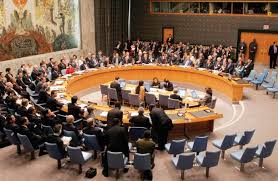The Washington Times
by Edith M. Lederer – Associated Press

The U.N. Security Council announced its support for the U.N. peacekeeping mission in the disputed Western Sahara late Thursday, calling for the controversy between Morocco and the U.N. secretary-general to be addressed so the mission can resume full operation.
Morocco expelled 73 international civilian staff members with the peacekeeping mission and closed a military liaison office to protest Secretary-General Ban Ki-moon’s use of the word “occupation” in describing the status of the vast mineral-rich territory during a recent visit to camps in Algeria for Western Sahara refugees. Eleven other civilians ordered out had already left the mission, known as MINURSO.
Morocco annexed Western Sahara, a former Spanish colony, in 1975 and fought a local independence movement called the Polisario Front until the U.N. brokered a ceasefire in 1991. The Security Council authorized the U.N. mission to monitor the cease-fire and help organize a referendum on the future of the vast mineral-rich region, but that has never taken place because of disputes over voter lists.
The Security Council initially tried to resolve the latest crisis through individual contacts between its 15 members and Morocco, but that didn’t seem to work.
Morocco’s Foreign Minister Salaheddine Mezouar said Thursday the decision to expel the civilian staff is “irreversible.” And the Polisario Front’s U.N. representative, Ahmed Boukhari, warned again Thursday that “the shortest way towards a war is the dismantling of MINURSO.”
The Security Council, which had been discussing the crisis behind closed doors all week, met again Thursday for over three hours and agreed on “press elements” – its lowest level of response.
The council expressed “serious concern” at the recent developments and noted the U.N. Secretariat’s assessment of the impact of the departures on the peacekeeping mission.
A U.N. official warned Wednesday that MINURSO will have to shut down unless Morocco reverses its unprecedented expulsion order.
The official, who spoke on condition of anonymity because of the sensitivity of the issue, said the secretary-general wanted the Security Council to take action to protect MINURSO. But the press elements agreed by the council late Thursday do not authorize any action.
Instead, the council stressed the importance of addressing the circumstances that led to the current situation “in a constructive, comprehensive and cooperative manner … so that MINURSO may resume its full capacity to carry out its mandate,” which is outlined in several U.N. resolutions.
Angola’s U.N. Ambassador Ismael Gaspar Martins, the current council president, told reporters: “The message is that we have discussed in a constructive manner, that we are concerned, that it is a problem that has to be resolved, and I hope it will be.”
The bottom line is that the Security Council needs to “take account of our primary responsibility which is keeping peace and security in the world,” he said.
Pressed on how the controversy was going to be addressed, Gaspar Martins noted that council members have bilateral relations with Morocco.
Morocco considers Western Sahara as its “southern provinces” and has proposed wide-ranging autonomy for the region, but the Polisario Front insists on self-determination through a referendum for the local population – as called for in U.N. resolutions.
The Polisario Front’s Boukhari said he was “somewhat happy” with the council for expressing serious concern and trying to make sure that MINURSO can function at its full capacity, which is “our common objective.”
But the Security Council should have taken “stronger steps” toward restoring MINURSO and sent a stronger message to Morocco, which is mainly responsible for the continuing crisis, he said.
__
Associated Press writer Samia Errazzouki contributed to this report from Rabat, Morocco.






